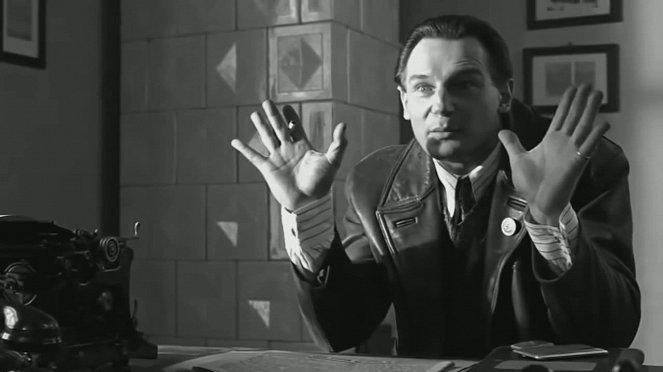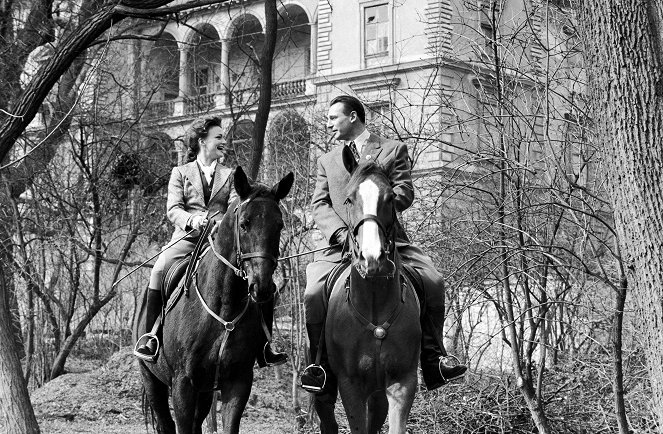Directed by:
Steven SpielbergScreenplay:
Steven ZaillianCinematography:
Janusz KaminskiComposer:
John WilliamsCast:
Liam Neeson, Ben Kingsley, Ralph Fiennes, Caroline Goodall, Jonathan Sagall, Embeth Davidtz, Małgorzata Gebel, Mark Ivanir, Andrzej Seweryn (more)VOD (4)
Plots(1)
Adapted from the novel by Thomas Keneally, Steven Spielberg’s masterful film tells the incredible true story of the courageous Oskar Schindler (Liam Neeson). Initially a member of the Nazi party, the Catholic Schindler risks his career and life, and ultimately goes bankrupt, to employ 1100 Jews in his crockery factory during the Holocaust. Schindler’s Jewish accountant (Ben Kingsley) serves as his conscience, as Schindler conducts business with an obstinate and cruel Nazi commander (Ralph Fiennes), who viciously kills Jewish prisoners from the balcony of his villa overlooking a prison camp. Filmed entirely in black-and-white on location in Poland, Schindler’s List does not downplay the faults of its magnanimous and unlikely hero, but relates a story of the triumph of the human spirit in the face of horrific devastation and tragedy. (Universal Pictures UK)
(more)Videos (8)
Reviews (11)
If there is one single example of a film that is both excellent and thematically important, it is Schindler's List. Where else could you feel the indescribable horror and shame of the human deeds you have just seen, photographed in the most horrifying but at the same time most beautiful black and white composition imaginable? The scene with the little girl in the red coat, walking as a symbol of colourful innocence through pure hell, is probably the most powerful I have ever seen in a film, and it brings tears to my eyes every time; and even if it was the only one in the whole movie, I'd still never get this film out of my head – but it's not, not even close. Masterpiece.
()
Someone once described Schindler's List as the building block of Holocaust film history. Its influence confirms this, of course. Nicky's Family is not the only project that has taken inspiration from it almost literally, as Steven Spielberg simply chose to speak a universal language for academics and ordinary people alike.
()
Spielberg's sensitive precision, Williams's music, Kaminsky's cinematography, Neeson's eyes, Fiennes's villain, Kingsley's everything, the little girl in the red dress walking through the black and white film... An unforgettable story. PS: Finally seen in the cinema on the occasion of the 25th anniversary. Indescribable experience.
()
I consider Steven Spielberg to be one of the best storytellers in the world of film, regardless of how many stars I give to Schindler's List. He is an excellent craftsman and storyteller. Some voices in the community of film fans sometimes argue that he is too commercial and that they only take Schindler's List or Saving Private Ryan seriously from his work. I have the exact opposite feeling. Spielberg has always told fairy tales, whether for children or adults, and they are perfectly suited for relaxation and genre projects. Sci-fi, adventure stories, or fantasy from his workshop are usually treats. It's worse when he tries to enter the realm of high art and wants to do timeless, more serious work. Spielberg still uses similar or identical means as in his relaxation projects. In Schindler's List, several quite serious things bother me. First, the whole story is based on an artificially created myth, and even though its core is true, it ultimately sounds like Radio Yerevan reports. The facts are upside down here. Oskar Schindler was an adventurer, a Nazi not out of conviction but based on hard calculation, a manipulator, and a ruthless exploiter. Much negative can be said about him, and it would be much more accurate to despise and condemn him rather than admire him. Historical films usually approach the interpretation of historical facts languidly and only take from them what they need to achieve their goal or a partial effect. And usually, if it concerns distant history, viewers don't mind – except for historians and fans of historical science. But here it is so striking and concerns such a sensitive topic that it fundamentally bothers me. Schindler's real role has already been mapped by historians and completely contradicts everything Spielberg portrays in his film. In the labor camp, prisoners were mainly selected from the ranks of the Jewish police, collaborators, or those who had to pay. The conditions in the camp were very harsh, and its only advantage was that it was not systematically exterminationist, meaning that there were no gas chambers. Schindler was completely indifferent to the prisoners, and all he cared about was how to monetize their slave labor. By the way, neither Oskar Schindler nor anyone else saved any human lives. For those who were taken to the Protectorate, other prisoners had to be selected for liquidation… Another problem is Spielberg's typical squeezing of emotions, where possible, emotional manipulation, moving, blackmailing, and behaving like a typical blockbuster producer. Despite all this, he managed to convey the horrors of the Holocaust to the widest audience at a time when many decades had passed since the events and eyewitnesses were dying out, which is not insignificant. At the very least, the scene of the ghetto liquidation belongs among the memorable film moments. Overall impression: 60%.
()
The right-wing view of the Holocaust is not something I agree with, but at the very least it's refreshing to be able to deal with it these days. Schindler's List could easily be read as a defense of capitalism, whose values are "supra-ideal" and pragmatic, making it incapable of the irrational evil that the Holocaust is generally considered to be (which is conveniently myopic, of course, since every young child knows about its economic motivations). Equally, it can be read as advocacy of a trickle-down economy, whereby a wealthy factory worker develops a relationship with his employees, tries to keep them, and gradually sees them as human beings whom he can use his abilities to save. That makes this film have far more problematic levels than the 100 times rehashed closing sentiment (as awful as it is). However, Spielberg and Kaminski (whose creative input here I tend to place higher than the director's; after all, look at what kind of cinematic leap this is from Jurassic Park or Hook) have managed to translate the methodical chaos of the Holocaust to the screen perfectly in several scenes here, creating the illusion of a documentary and a surreal nightmare at the same time, as the situation must have had on many in retrospect. Nemes's Son of Saul is a few paces farther ahead in this, but I think it stands on the foundation of what Schindler's List built in certain places.
()



Ads